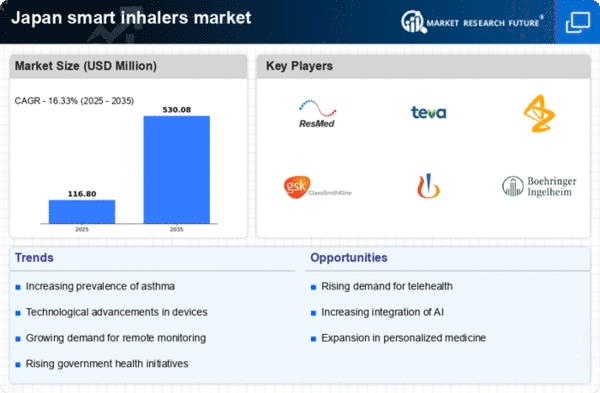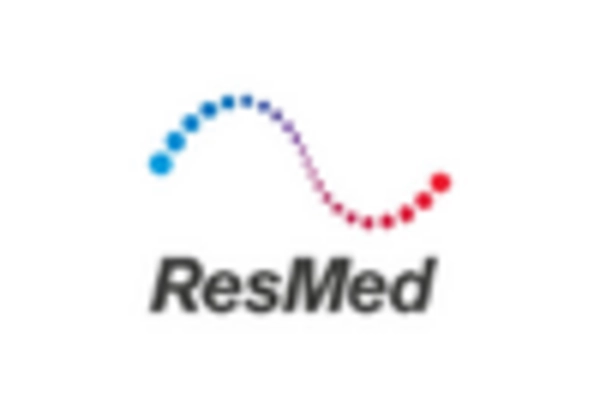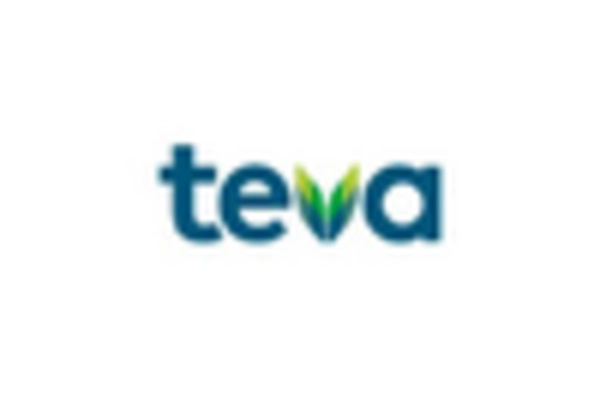Government Initiatives and Funding
Government support plays a crucial role in the growth of the smart inhalers market in Japan. Various initiatives aimed at improving respiratory health and promoting innovative medical technologies are being implemented. The Japanese Ministry of Health, Labour and Welfare has allocated substantial funding for research and development in respiratory care, which includes smart inhaler technologies. This financial backing is expected to encourage manufacturers to invest in the development of advanced inhaler systems. Furthermore, public health campaigns aimed at raising awareness about respiratory diseases and the importance of medication adherence are likely to drive market growth. As the government continues to prioritize respiratory health, the smart inhalers market is poised for expansion.
Technological Advancements in Healthcare
Technological innovations are transforming the healthcare landscape in Japan, significantly impacting the smart inhalers market. The integration of digital health technologies, such as mobile applications and cloud-based data management, enhances the functionality of smart inhalers. These devices not only track medication usage but also provide valuable insights into patient behavior and environmental triggers. The Japanese government has been actively promoting digital health initiatives, which could further stimulate the adoption of smart inhalers. As a result, the market is likely to witness a surge in demand for devices that offer enhanced connectivity and user-friendly interfaces. The potential for improved patient outcomes through technology-driven solutions positions the smart inhalers market favorably within the broader healthcare ecosystem.
Growing Awareness of Medication Adherence
Awareness regarding the importance of medication adherence is gaining traction in Japan, significantly impacting the smart inhalers market. Non-adherence to prescribed medication regimens is a persistent issue, particularly among patients with chronic respiratory conditions. Smart inhalers address this challenge by incorporating features that remind patients to take their medication and track their usage. Educational initiatives by healthcare professionals and organizations are emphasizing the consequences of non-adherence, which could lead to exacerbated health issues and increased healthcare costs. As patients become more informed about the benefits of adhering to their treatment plans, the demand for smart inhalers is likely to rise. This growing awareness is expected to drive market growth and encourage manufacturers to innovate further in this space.
Rising Prevalence of Respiratory Diseases
The increasing incidence of respiratory diseases in Japan is a primary driver for the smart inhalers market. Conditions such as asthma and chronic obstructive pulmonary disease (COPD) are becoming more prevalent, affecting millions of individuals. According to recent health statistics, approximately 10% of the Japanese population suffers from asthma, which necessitates effective management solutions. Smart inhalers, equipped with advanced technology, offer real-time monitoring and adherence tracking, which are crucial for managing these chronic conditions. The growing awareness of respiratory health and the need for innovative treatment options are likely to propel the demand for smart inhalers in the market. As healthcare providers emphasize the importance of personalized treatment plans, the smart inhalers market is expected to expand significantly in response to these health challenges.
Increasing Demand for Personalized Medicine
The shift towards personalized medicine is influencing the smart inhalers market in Japan. Patients are increasingly seeking tailored treatment options that cater to their specific health needs. Smart inhalers, with their ability to collect and analyze data on individual usage patterns, provide a platform for personalized treatment plans. This trend aligns with the broader movement in healthcare towards individualized care, where therapies are designed based on patient characteristics. The potential for smart inhalers to enhance medication adherence and optimize treatment outcomes is likely to attract both patients and healthcare providers. As the demand for personalized healthcare solutions continues to rise, the smart inhalers market is expected to benefit from this evolving landscape.
















